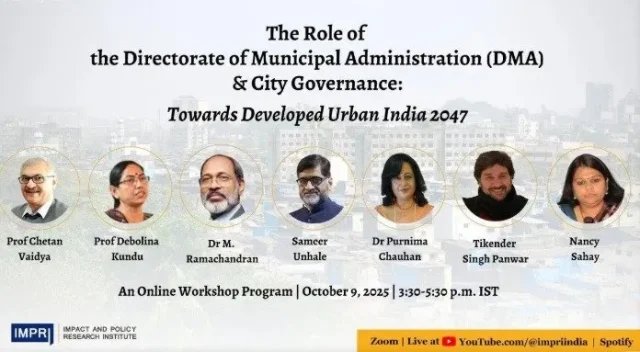Event Report
Tanmyi Anthwal
Organiser: IMPRI Centre for Habitat, Urban and Regional Studies (CHURS), IMPRI Impact and Policy Research Institute, New Delhi
Date: 9 October 2025
Format: #WebPolicyTalk — Online workshop (Zoom | YouTube Live | Spotify)
Introduction
On 9 October 2025, the IMPRI Centre for Habitat, Urban and Regional Studies (CHURS) brought together leading administrators, urban practitioners, and scholars for a #WebPolicyTalk on “The Role of the Directorate of Municipal Administration (DMA) & City Governance: Towards Developed Urban India 2047.” Against the backdrop of rapid peri-urbanisation, rising census towns, and overlapping mission architectures, the workshop emphasised that India’s urban ambitions for 2047 will be realised not by infrastructure projects alone but by strengthened municipal institutions. Speakers noted that a reimagined DMA – with clear legal mandate, fiscal tools, professional cadres, and data-driven systems – can act as the indispensable broker that translates national and state priorities into reliable local service delivery, resilience, and inclusive growth.
This discussion aligns closely with the broader national vision of India@2047 and the National Urban Policy Framework (NUPF), which emphasises building resilient, inclusive, and data-driven systems of urban governance.
The session moved from contextual reflections on institutional reforms to specific administrative insights shared by experts and practitioners, creating a bridge between policy intent and field experience.
Session overview
The two-hour workshop was chaired by Prof. Chetan Vaidya, Former Director, National Institute of Urban Affairs (NIUA) & School of Planning and Architecture (SPA), Delhi; Visiting Distinguished Professor, IMPRI. Prof. Vaidya opened by acknowledging that municipal administration is often perceived as a “dry subject,” yet it plays a critical role in shaping urban outcomes. He noted that the DMA’s influence depends not merely on its nomenclature but on its mandate and resources, urging participants to view DMAs as strategic intermediaries capable of harmonising planning, finance, technology, and citizen engagement across municipal tiers.
Following these reflections, the session transitioned to opening remarks that situated DMA reform within broader urbanisation trends and institutional realities.
Opening remarks
Prof Debolina Kundu, Officiating Director, National Institute of Urban Affairs (NIUA), delivered the opening remarks, situating DMA reform within contemporary urban dynamics. She emphasised the changing geography of urbanisation—particularly peri-urban growth and the rise of census towns—and described how these processes complicate jurisdictional clarity and service delivery. Prof. Kundu observed that peri-urbanisation in India is increasingly occurring in situ, as rural areas transition into urban settlements through outward growth. She noted the pressing need for DMAs to translate national and state urban goals into locally adapted responses across diverse settlement types.
Her remarks underscored how effective DMA reform can bridge spatial and governance transitions, setting the tone for the analytical discussions that followed
Inaugural perspective: Institutional continuity
Dr M. Ramachandran, Former Secretary, Ministry of Housing and Urban Affairs (MoHUA), reflected on how successive national missions have modernised urban infrastructure while sometimes creating parallel implementation channels. He called for DMAs to assume stronger leadership in aligning mission objectives with municipal capacity and cautioned against over-reliance on external consultants. Instead, Dr. Ramachandran argued that an empowered DMA should build and retain in-house technical skills, steer performance-linked accountability frameworks, and support municipalities in improving both service standards and local revenue mobilisation.
He emphasised that external consultants can play supportive roles, but the real strength lies in institutional capacity-building that enables DMAs to sustain reforms beyond project cycles. This smooth integration of expertise and in-house competence framed the workshop’s call for continuity in institutional reform.
Speaker Section
The panel showcased practitioner perspectives from four experienced speakers, each offering state-grounded lessons on strengthening DMA functions and enhancing municipal effectiveness. The discussions flowed across domains of digital governance, fiscal reform, community engagement, and local autonomy.
Digital governance and performance
Mr Sameer Unhale, Joint Commissioner, Department of Municipal Administration, Government of Maharashtra; Urban Practitioner; Visiting Senior Fellow, IMPRI described Maharashtra’s digital governance initiatives—real-time dashboards for grievance redressal, integrated public service platforms, and data-driven performance monitoring. His account reflected the ongoing transformation under Maharashtra’s e-governance framework and the National Urban Digital Mission (NUDM), underscoring how digital platforms can enhance transparency and inter-departmental coordination.
He emphasised that technology succeeds only when embedded within institutional incentives and backed by continuous staff training. His presentation offered a roadmap for embedding digital systems within everyday governance processes, ensuring accountability and performance-linked culture.
Fiscal resilience and human resources
Dr Purnima Chauhan, IAS (Retd), Former Secretary, Govt. of Himachal Pradesh & Director, Himachal Pradesh Institute of Public Administration (HIPA); Visiting Senior Fellow, IMPRI focused on fiscal and human-resource reforms. She identified property-tax modernisation as a top priority and explained that underperformance stems from outdated valuation, weak billing systems, and political reluctance to update assessments.
Dr. Chauhan noted that systematic property-tax reform—anchored in DMA support, digital billing, and improved audit frameworks—can build fiscal resilience and municipal credibility. Her analysis linked financial sustainability directly with institutional competence and political will.
Community‑centred delivery
Smt Nancy Sahay, (IAS) Director, Directorate of Municipal Administration, Department of Urban Development & Housing, Jharkhand, provided an on-the-ground account of how a state DMA can enable community-centred urban services. She discussed Jharkhand’s initiatives in sanitation, waste management, and e-governance aimed at strengthening grievance mechanisms and citizen engagement.
Smt. Sahay noted that skill enhancement of ULB functionaries, strong grievance redressal mechanisms, and performance dashboards are critical for sustained service improvement. She added that DMA-led interventions should be policy-anchored, ensuring alignment between digital transformation, capacity building, and citizen participation.
Political decentralisation and Local autonomy
Mr Tikender Singh Panwar, Member, Kerala Urban Policy Commission; Former Deputy Mayor, Shimla; Senior Fellow, IMPRI, offered a practical perspective on political and functional autonomy. He argued that devolving authority without accompanying fiscal capacity and technical support undermines local responsiveness. He recommended that DMAs actively advocate for clearer functional devolution, stronger own-source revenues for municipalities, and participatory planning mechanisms that embed communities in local decision-making while maintaining professional municipal administration insulated from short-term project pressures.
Together, these practitioner insights illustrated the DMA’s evolving role as both a technical facilitator and a policy integrator.
Cross‑cutting themes
The cross-cutting themes from the workshop revealed shared priorities and reform directions across states.
First, legal and institutional clarity was underscored as essential. Municipal laws and state rules must explicitly define DMA functions—technical assistance, performance monitoring, training, and inter-departmental coordination. Models such as Gujarat’s strengthened Directorate offer useful lessons, though reforms must remain context-specific rather than one-size-fits-all.
Second, fiscal resilience emerged as a foundational issue. Speakers underscored the need for state DMAs to lead property-tax modernisation, rationalise user fees, and design performance-linked grants that reward service improvements. Predictable, incentive-aligned transfers and robust own-source revenues were emphasised as vital for municipalities to plan prudently and invest sustainably.
Third, capacity building and human-resource development were identified as recurrent imperatives. The panel emphasised that DMAs must institutionalise continuous learning through state training institutes and partnerships with NIUA and HIPA. Moving beyond episodic workshops, career-path frameworks and accredited modules were seen as necessary to professionalise municipal cadres.
Fourth, digital governance was highlighted as a critical enabler. As illustrated by Maharashtra’s experience, digital dashboards, grievance portals, and asset registries are powerful when linked with institutional incentives. Yet, DMAs must also address digital divides and invest in basic digital literacy to ensure equitable adoption.
Finally, inclusion and climate resilience were seen as integral. The panel emphasised that DMAs should mainstream gender-sensitive design, collect sex-disaggregated data, and integrate climate risk assessments into planning—especially in smaller towns with limited adaptive capacity.
Policy recommendations
To consolidate these insights, the workshop proposed a coherent policy roadmap. States should undertake legislative reviews to clarify DMA mandates and institutionalise performance monitoring. DMAs must drive state-level property-tax modernisation supported by technical assistance, build institutional training frameworks, and scale e-governance pilots alongside capacity investments. Establishing performance-linked grants and structured community-engagement platforms can ensure that service delivery remains citizen-oriented, accountable, and resilient.
Conclusion
As the session drew to a close, the discussions transitioned from technical insights to a broader reflection on what it will truly take to achieve India’s urban vision for 2047.
The deliberations made one thing clear: achieving a truly developed urban India by 2047 is first and foremost an institutional project. Strengthening DMAs legally, financially, and technically offers a high-leverage path to better municipal outcomes—predictable property-tax systems and performance-linked transfers to secure finances; accredited training and career paths to professionalise municipal cadres; and targeted e-governance and data platforms coupled with human capacity to make service delivery transparent and efficient.
Crucially, reform must preserve local political agency while providing the DMA with the tools and resources to act as a system integrator rather than a mere inspectorate. The workshop closed with a call for sustained, multi-cycle institutional investment—anchored in legislative clarity, continuous capacity enhancement, and measurable performance frameworks—that will enable DMAs to transform short-term projects into enduring municipal capability and, in turn, make India’s urban promise real by 2047.
Acknowledgements
IMPRI CHURS expresses gratitude to Prof. Chetan Vaidya, Chair; Prof. Debolina Kundu, Opening Speaker; Dr. M. Ramachandran, Inaugural Speaker; and panelists Mr. Sameer Unhale, Dr. Purnima Chauhan, IAS (Retd.), Smt. Nancy Sahay, IAS, and Shri Tikender Singh Panwar for their insightful contributions.
The report was written by Tanmyi Anthwal, Research Intern at IMPRI



















